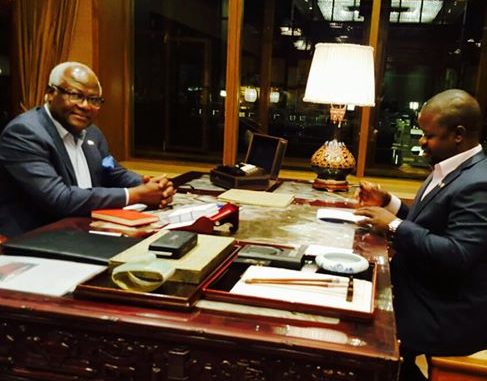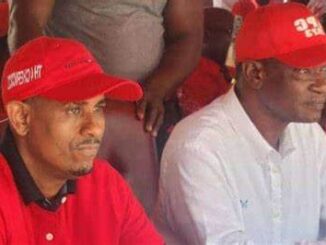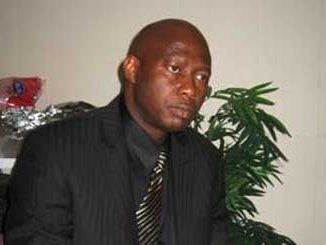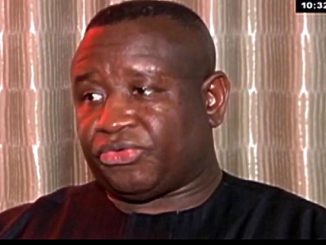
John Baimba Sesay- CHINA
President Ernest Bai Koroma on December 6th, 2016, ended a week-long visit to the People’s Republic of China. The core of the visit was to express Sierra Leone’s appreciation and thanks to China for their timely intervention in the fight against ebola. The visit was also meant to scale up ties of cooperation between the two nations at both bilateral and multilateral levels.
During the visit, the President had fruitful discussions with his Chinese counterpart, President Xi, calling for the ties of friendship and cooperation to be scaled up towards a comprehensive strategic partnership.
Before departing for Sierra Leone, I conducted a one-on-one exclusive interview with President Koroma on a range of issues, all tied to his visit:
John: What were the outcomes of your visit?
President Koroma: I have had the opportunity to come and say thank you to the Government and people of China for the quick manner in which they responded, when we appealed for assistance during the fight against ebola. Their response was not only quick, the manner in which it was effected was unique in that, they did not only send their personnel, equipment and other items, but they chartered cargo planes and a good number of planes landed in Freetown with items of support including a mobile lab and later, a fixed lab and medical personnel, including a military support team. That was the direct support provided to the Government.
They also indirectly through the UN and the UN Agencies, supported, by providing funding to WHO, through the AU and this was a great support. They were quick in responding and I must say that, maybe that response to some extent triggered a lot of other international responses. So for somebody who responded quickly and in a manner that was unique, I think when we are through with ebola, I should come and say thank you and that is one of the outcomes.
But over and above that, we had an opportunity, through the bilateral discussions, to strengthen the ties between the two countries. And as you have heard the pronouncements made by President Xi Jinping himself, he has escalated our relationship to a Comprehensive Strategic Status, which is the highest pinnacle of bilateral relationship that China extends to countries.
He also made a big pronouncement especially about supporting our health sector to become more resilient. He is going to help us with a Centre for Disease Control that would not only serve Sierra Leone, but West Africa as a whole. He also included in that package other support to the health sector.
Also, he has provided support to our military with some naval capabilities. He has provided support by a way of debt relief. He has also supported us with rice. He has also urged us to continue to work within the new framework of engagement between Africa and China. That is the FOCAC that met last December in South Africa. So at the bilateral level, I can say that we have had all of these outcomes.
John: And what about your meetings with Chinese enterprises?
President Koroma: I had the opportunity to meet a lot of business groups. As you know, we have a few Chinese companies already engaged in doing business in the country and one such company is the Shandong Group; that is the biggest Iron Ore Mine, which has already started operations. I have visited their headquarters and we had meetings with the top management of Shandong with a view of trying to scale up their production levels. I think on a whole, we have had the opportunity to know the company better, and to also explore the possibilities of looking at other opportunities beyond Iron Ore. They are like a conglomerate with so many activities and I am sure the visit to the company has opened up a lot of opportunities, and I look forward to receive them shortly so that we can continue with the engagement.
We also visited their Airport and Seaport, one of the largest seaports in Qingdao. We rode over what they have called the longest bridge in the world, which is over 40 kilometers and these are all inspirational visits. They have inspired me to work very hard on seeing the commencement of the Mamamah project.
John: Did anything come up on Mamamah during your meeting with President Xi?
President Koroma: Well, we did mention our desire to continue with the project .They also have restated their commitment to give us support. We are still in discussions with them and when we are through with those discussions, hopefully soon, we will sign off that project and it will commence.
John: You are visiting at a time both nations are marking forty-five years of bilateral ties. What else can we point at in terms of sustaining the ties?
President Koroma: I would say that a lot has happened. At the bilateral level and even at the level of the embassies, we have scaled up the activities of the embassies. We do not have only diplomats there, we now have people with specific responsibility for commerce and the private sector; we have scaled up by recently appointing Defence Attachés. This in itself, clearly tells that we have now heightened the engagement to even dealing with specific activities, shifting from just normal diplomacy as it were, to engagement on a person-to-person basis, building our economic ties and military capabilities, and new co-operations. This has happened because of the kind of development that has taken place over the years.
China has contributed greatly in our infrastructural development programmes; the road construction, agriculture, health, education; we have now an increased number of students. When we started it was just a handful. Now we have over 100 students that are here .These are all indicators of the progress we have made and the activities we are engaged in. So I would say that a lot has happened.
We are now trying to do more in terms of collaboration. During this visit, the President expressed a desire for our militaries to be conducting joint exercises or trainings. They are already providing us support in military trainings at the highest level. We are also looking at trying to work with the private sector, the private engagement is growing. A lot of Sierra Leonean business men do now come to China to do business.
I cannot say it is just one sided. The relationship has been mutually beneficial. Time there was when we supported China to get into the United Nations and we have always supported them in international affairs. They have also supported us; it is not just a question of the recent ebola. They have spoken on our behalf in the United Nations Security Council. I think it is a relationship that has grown up over the years and it has been based on mutual respect and trust.
John: As Chair of the C-10, leading the advocacy for a reform of the UN Security Council, how did that aspect help in shaping your discussions with your Chinese counterpart?
President Koroma: We have been engaging with China. I must say that they have shown a lot of sympathy for the African Position. They’ve expressed it openly and during our discussions, he (Xi Jinping) also indicated that we must stay engaged because they are of the view that Africa has a justifiable case. That is not for them to take a decision alone .That is why we will continue to engage them along with other members of the Security Council especially members of the P5.
John: In 2015, along the lines of cooperation, FOCAC announced in South Africa a 10 Points Action Plan. How positioned are we to utilize some of those Action Points?
President Koroma: Luckily, we have rolled out in our country, our Agenda for Prosperity. What is contained by way of plans or activity areas in the FOCAC are mostly in line with our Agenda for Prosperity programmes. That is why it is easy for us to quickly identify projects and activities, to quickly work along other African countries especially on regional issues to implement the programmes of expectations by the Chinese as clearly outlined in the FOCAC engagement.
John: At the level of political diplomacy, what did you get from this visit, given your meeting with top leaders of Communist Party of China, especially in Shandong?
President Koroma: Well, you know, the CPC has been closely associated with the APC and most of the established structures of the APC were initially copied from the CPC. Even the use of the word ‘comrade’ that we still use in the Party was kind of borrowed from the CPC. We have still maintained that relationship.
Just recently, a high-powered delegation from the CPC visited Sierra Leone and they visited and had meetings with the Party, with a view of trying to share experiences and see how the Party can even play a better role in trying to influence government’s decisions.
We had a meeting with the Secretary-General (Shandong Province) and he was very clear on how they performed their duties and relate with government. We are slightly different in that respect but I think there is a lot we can learn from them and we have promised that we will continue to send our teams here.
Again, recently, the Secretary-General (APC) was here leading a Party delegation. We have had representatives from all organs of the Party visiting. So we have a relationship that has stayed alive.
As we are now trying to effect some changes in the Party, we are going to model it along the lines of what they have done here because to a great extent I see that the Party has a big role to play, and they have been providing a kind of leadership and direction which has successes. At every level you see the Party participating in the governance activities.
John: Thank you Mr. President
President Koroma: You’re welcome!
Wilfred Leeroy Kabs-kanu




